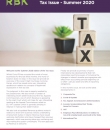Ireland has had formal transfer pricing legislation since 2011. The legislation provided that the relevant person is required to have certain documentation in place and available for review if requested by Revenue. Previously, Revenue accepted documentation that had been prepared in accordance with either the OECD Transfer Pricing Guidelines or the code of conduct adopted by the EU Council in relation to transfer pricing documentation. This was implemented to reduce the additional burden imposed on multi-national groups as there would already be documentation in place where the counterparty is resident in territory which already has transfer pricing legislation.
Changes were introduced in Finance Act 2019 and are in force for accounting periods beginning on or after 1 January 2020, effectively to legislate for the 2017 updated OECD Transfer Pricing Guidelines. The most significant changes for many groups are set out below:
The Local File is a detailed document showing that all material intra-group transactions are executed using the arm’s lengths pricing. Businesses used to have 3 months to submit documentation to Revenue upon request. This has now been reduced to 30 days. Failure to prepare and submit the required documentation will attract penalties of €25,000 or greater for larger businesses; or €4,000 for those companies under the €50 million threshold.
Revenue have also ramped up their own internal transfer pricing expertise. It is clear that corporate groups can expect to see more activity from Revenue in this area than has heretofore been the case. Irish corporate groups should review their structures, their inter-company pricing and in particular any financing arrangements in place that involve the granting of interest free loans to related companies in other jurisdictions in order to determine whether the new legislation applies to them. Documentation is critically important.
The EU Council Directive 2018/822 concerning cross-border tax arrangements, known as DAC 6 introduces an obligation on both intermediaries (i.e. lawyers, tax advisers & accountants) and tax payers to disclose potentially aggressive tax planning arrangements to their local tax authorities. It also requires tax administrations to subsequently exchange this information with the tax authorities in other jurisdictions. DAC6 mirrors many of the concepts and principles of the Irish domestic mandatory disclosure reporting requirements introduced in recent years and is designed to increase transparency across jurisdictions.
A DAC6 reporting obligation is triggered when a cross border transaction falls within one of the “hallmarks” which are detailed in the Directive. There are certain arrangements that will only become reportable where one of main benefits of the arrangement is obtaining a tax advantage. There are also some arrangements that are automatically reportable regardless of whether the main benefit of the transaction was to claim a tax advantage i.e. instances where double deductions have been claimed for tax depreciation or where double tax relief is claimed in more than one jurisdiction.
In light of COVID-19 the EU Commission has proposed the following deferrals:-
| Reportable Transaction | Original Reporting Date | Proposed Deferral Date |
| Introduction of reporting within 30 days of the reportable transactions taking place | 1 July 2020 | 1 January 2021 |
| Historical transactions that took place between 25 June 2018 to 30 June 2020 | 31 August 2020 | 28 February 2021 |
Irish Revenue confirmed in an eBrief on 26 June that they have opted into the deferral.


Transfer Pricing 1.52 MB
In a world of fast-evolving tax rules, increased cross-border activity, and heightened regulatory scrutiny, transfer pricing is no longer just a compliance issue. It is a strategic business imperative. Our dedicated Transfer Pricing team brings hands-on experience across a wide range of sectors, helping clients navigate complex legislation and design solutions that are not only defensible, but commercially aligned and future-ready. RBK Transfer Pricing Brochure
Download
Doing Business in Ireland 2025 15.19 MB
Welcome to RBK’s Doing Business in Ireland Guide 2025. This is a very valuable resource for businesses thinking of doing business in Ireland and in the broader EU. Please contact one of our International team today if you would like to discuss any element in further detail, we would be very happy to assist you. Link here to the RBK Doing Business in Ireland Guide 2025: https://online.flippingbook.com/view/998461985/Doing Business in Ireland 2025 - Finalised
Download
Doing Business in Ireland 2024
We are delighted to announce the release of the 2024 version of our long standing Doing Business in Ireland Guide. This is a great resource for businesses operating in Ireland, those considering setting up a business in Ireland or those just interested in investing in Ireland. Please contact one of our International team today if you would like to discuss any element in further detail, we would be very happy to assist you.RBK - Doing Business in Ireland 2024
Download
International Tax & Transfer Pricing Update - Jan 24 2.43 MB
RBK Chartered Accountants held an International Tax and Transfer Pricing Hybrid Seminar on 24 January 2024. We were by our Leading Edge Alliance (LEA Global) member firms, US tax and transfer pricing specialists Bennett Thrasher and Dutch tax specialists Van Oers to discuss and considered key developments in international tax and in the transfer pricing environment.
Download
Tax Issue - Summer 2020 137.61 KB
Whilst Covid-19 has occupied the minds of most businesses for the last three months, the world of taxation does not stop. In this issue we provide an overview of the recent High Court case involving Perigo, which has raised some very interesting questions in relation to concepts of legitimate expectative in Irish tax law. We also review a number of interesting recent determinations of the Tax Appeals Commissioners. We look at updated Revenue guidance notes in relation to short term business visitors undertaking employment duties in Ireland. Finally we provide a summary of some international tax developments that Irish corporates need to be aware of including the changes in Ireland’s transfer pricing regime with effect from accounting periods beginning on or after 1 January 2020 and DAC 6 reporting obligations.
DownloadOur offices are strategically located to service our market and are easily accessed from any location nationwide.
Termini,
3 Arkle Road,
Sandyford, Dublin,
D18 C9C5, Ireland
RBK Incorporating OMC O'Malley & Company Limited,
Upper Chapel Street,
Castlebar, Co Mayo,
F23 PF21, Ireland
RBK House, Irishtown
Athlone,
Co. Westmeath,
N37 XP52, Ireland
RBK Incorporating MCP Accountants,
Breaffy Road,
Castlebar, Co Mayo,
F23 DY67, Ireland
